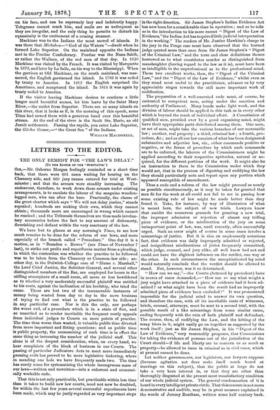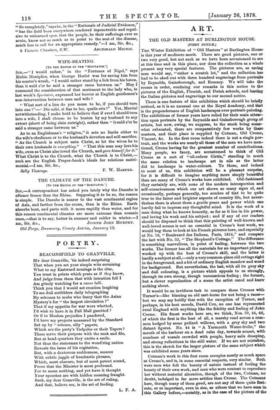LETTERS TO THE EDITOR.
THE ONLY REMEDY FOR "TILE LAW'S DELAY." (TO ME EDITOR or TIM "SPZOTATOIL1
San,—Mr. Osborne Morgan feelingly reminded us a short time back, that there were 601 cases waiting for hearing on the Chancery side, and 860 jury causes entered for trial at West- minster; and that the arrears were steadily increasing. The endeavour, therefore, to work down these arrears under existing -arrangements, is to emulate the labour of the sanguine wooden- legged man, who ran after the hare. Practically, the clause of the great charter which says "We will not delay justice," stands repealed; hundreds are seeking their own, which they cannot -obtain ; thousands more are encouraged in wrong which cannot be reached ; and the Tribunals themselves are thus made involun- tary accessories before the fact to any amount of dishonesty, nourishing and defiant within the very sanctuary of the law.
We have but to glance at any morning's Times, to see how much remains to be done for the reform of our laws, and more -especially of the branch called "Procedure." One day it is a motion, as in "Brandon v. Bowes" (see Times of November 7 last), to strike out prolix and superfluous matter from a pleading, in which the contention was whether the practice to be followed wars to be taken from the Chancery or Common-law side ; an- other day, in the Dulwich-College case of "flume v. Marshall," the Lord Chief Justice, the Solicitor-General, and several other -distinguished members of the Bar, are employed for hours in the stifling atmosphere of a small room, all more or less bewildered as to whether a very moderately successful plaintiff was entitled to his costs, against the inclination of his lordship, who tried the cause. These are but two of the innumerable instances of money being wasted from day to day in the mere business of trying to find out what is the practice to be followed in any particular case. Nor is this the only, nor perhaps the worst evil, of a procedure which is in a state of flux, and
.so unsettled as to render inevitable the frequent costly appeals from individual judges to Courts on mere points of practice. The time thus worse than wasted, is valuable public time diverted from more important and fitting questions ; and as public time is public property, the economising of such time is in effect the same thing as increasing the number of the judicial staff. This -alone is of the deepest consideration, when, on every hand, we tear complaints of the block of business in our Courts. The passing of particular Judicature Acts to meet more immediately pressing evils has proved to be mere legislative tinkering, where in mending one hole we have frequently made two. The time has surely come for systematising the whole incongruous mass of our laws—written and unwritten—into a coherent and economi- cally workable code.
That this is not only practicable, but practicable within less time than it takes to build new law courts, need not now be doubted, for within the last few years several successful experiments have been made, which may be justly regarded as very important steps inthe right direction. Sir James Stephen's Indian Evidence Act has now been for a considerable time in operation ; and as he tells us in the introduction to his more recent "Digest of the Law of Evidence," the Indian Act has required little judicial interpretation in the working." The readers of Mr. Justice Hawkins's charge to the jury in the Penge case must have observed that the learned judge quoted more than once from Sir James Stephen's "Digest of the Criminal Law," and the terse and clear definitions thence borrowed as to what constitutes murder as distinguished from manslaughter (having regard to the law as it is), must have been as intelligible to the unprofessional as to the professional mind.
These two excellent works, then, the "Digest of the Criminal Law," and the "Digest of the Law of Evidence," whilst even as they stand most useful to the practitioner, advance us by very appreciable stages towards the still more important work of codification.
The preparation of a well-executed code must, of course, be entrusted to competent men, acting under the sanction and authority of Parliament. Many hands make light work, and the division of labour should be applied in this task as in every other which is beyond the reach of individual effort. A Cominission of qualified men, presided over by a good organising mind, might have their appropriate parts distributed among them. One man, or set of men, might take the various branches of our mercantile law ; another, real property ; a third, criminal law ; a fourth, pro- cedure, eac.; and as all our law consists of what has been designated substantive and adjective law, viz., either commands positive or
negative, or the forms- of procedure by which such commands are to be enforced, the labours of the Commissioners might be
applied according to their respective aptitudes, natural or ac- quired, for the different portions of the work. It might also be an instruction to them in the Commission under which they would act, that in the process of digesting and codifying the law they should particularly note and report upon any portion which appeared susceptible of amendment.
Thus a code and a reform of the law might proceed as nearly as possible simultaneously, as it may be taken for granted that men fit for the work at all could not fail to see in passing how some existing rule of law might be made better than they found it. Take, for instance, by way of illustration of what is meant here, the subject of new trials. Lawyers know that amidst the numerous grounds for granting a new trial, the improper admission or rejection of almost any trifling piece of evidence, or the misdirection of the jury on some unimportant point of law, was, until recently, often successfully urged. Such an error might of course in some cases involve a miscarriage of justice. But it is also an unpleasantly notorious fact, that evidence was daily improperly admitted or rejected, and insignificant misdirections of juries frequently committed, which judge, counsel, and jury alike, all well knew had not and could not have the slightest influence on the verdict, one way or the other. In such circumstances the unsophisticated lay mind would naturally conclude that the verdict should be allowed to stand. Not, however, was it so determined.
"How can we say,"—the Courts (fettered by precedent) have in scores of cases demanded,—" How can we say what weight a
jury might have attached to a piece of evidence had it been ad- mitted? or what might have been the result had an improperly admitted piece of evidence been excluded?" It was pronounced impossible for the judicial mind to answer its own question, and therefore the case, with all its inevitable costa of witnesses, briefs, counsel, attorneys, must be sent to a second trial, with the possible result of a like miscarriage from some similar cause, ending frequently with the ruin of both plaintiff and defendant.
The course, then, of codifying the Law, and the hitting of the many blots in it, might easily go on together as suggested by the work itself ; just as Sir James Stephen, in his "Digest of the Law of Evidence," very reasonably proposes, that Commissions for taking the evidence of persons out of the jurisdiction of the Court should—if life and liberty are to concern us as much as property—be allowed to issue in criminal as in civil cases, which at present cannot be done.
Let neither governments, nor legislators, nor lawyers suppose (because agitation not does make itself much heard at meetings on this subject), that the public at large do not take a very keen interest in, or that they are other than thoroughly disgusted at the present most unsatisfactory condition of our whole judicial system. The general condemnation of it is heard in every intelligent private circle. That this censure is not more demonstrative and audible, may be in great measure explained in the words of Jeremy Bentham, written some half century back. "So completely," says he, in the "Rationale of Judicial Evidence," "has the field been everywhere rendered inpenetrable and repul- sive to unlearned eyes, that the people, be their sufferings ever so acute, know not so much as to point to the seat of the disease, much less to call for an appropriate remedy."—I am, Sir, i&c.,



































 Previous page
Previous page